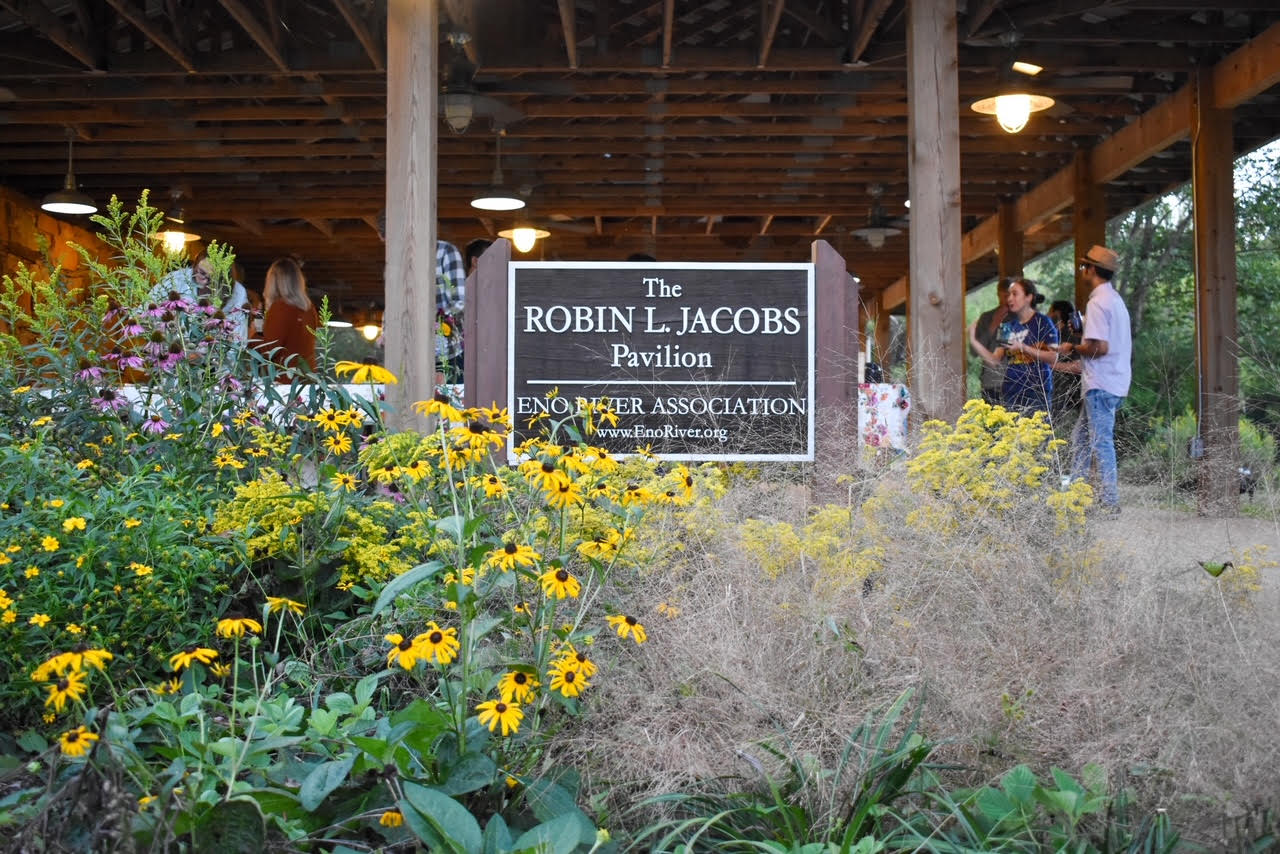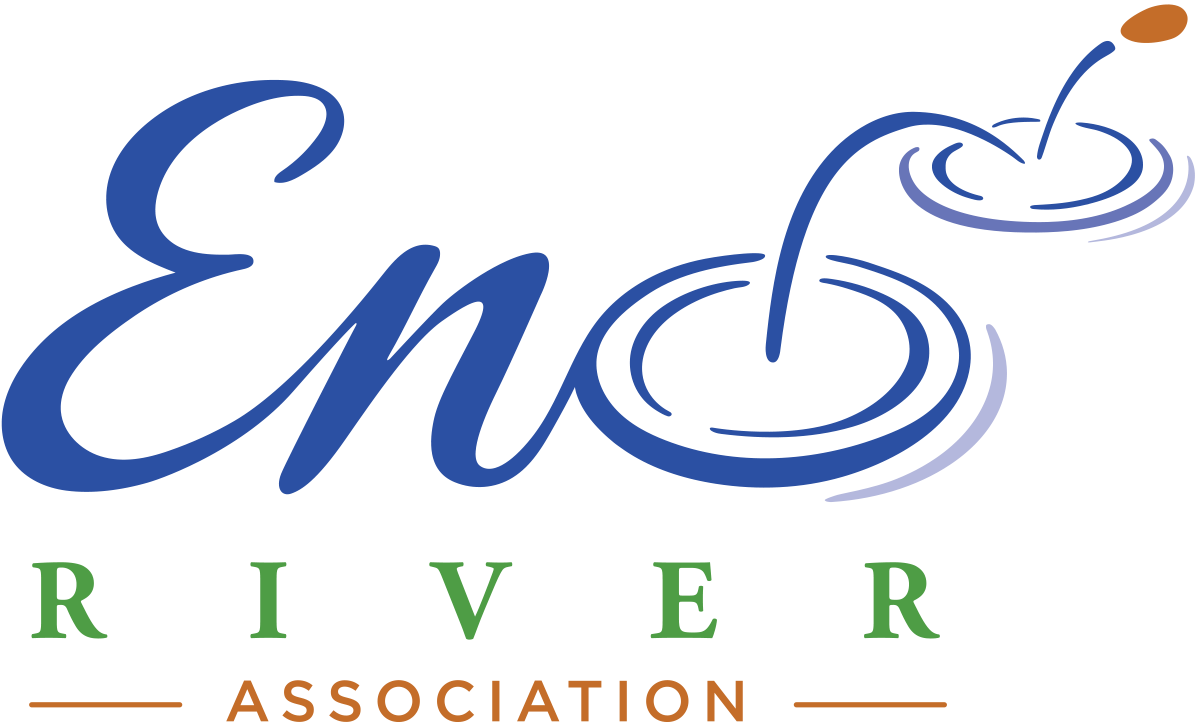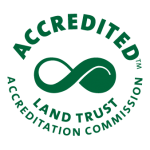
The following message is from our Executive Director, Ryan Fehrman, shared with Wildflower Society members during our gathering at the Confluence Natural Area in early June:
I want to start my comments with several things that I NEED to say before transitioning into everything that I want to say. The first is, thank all of you for joining me on this lovely early summer evening, thank you for supporting the Eno River Association, and thank you for making this work a priority. We are clearly living in a moment when the powers that be have ordained that clean air, clean water, and environmental conservation in general is no longer valued or prioritized. When we are told that the EPA’s mission is to, “lower the cost of buying a car, heating a home, and running a business”, that’s a direct quote by the way, it is a clear signal that our shared values are under attack, and that we must work together to prevent the systematic dismantling of a sector that conserves and protects the places that we hold dear. Thank you for being a part of this effort. Thank you for caring. Thank you for being an important part of our community.
Secondly, I’d like to recognize our Eno River Association board and staff members that are with us this evening. Please raise your hand and wave as I call your name. Joining us are board members Helen Kalevas, Jenn Weaver, Xavier Vallejo, Ellen Reckhow, Emily Friedman and Wendy Kuhn. From the staff, joining us are Interim Director of Philanthropy Hsi Chen, Finance & Operations Manager Nick Ferguson, Director of External Engagement Hillary Harrison, Land Stewardship Manager Indigo Roper-Edwards, Communications & Development Associate Tori Velasquez, and Evie Fitzpatrick, our Summer Communications Intern who is a rising junior at UNC – Chapel Hill.
I’ve been asked this evening to say a bit about my least favorite topic… me. I don’t like to talk about myself too much because the most important thing in the nonprofit world is the work. More than any other sector, our work is supported by a system of shared values that brings people together, motivates us, and provides an urgency to our actions. Yet I must concede that good people are any organization’s most important resource. In my first four months at ERA, I have seen first-hand the collection of passionate and talented people on our board and staff and it has been truly inspiring. ERA is not a perfect organization, but we do not have a people problem. To be able to work with this group is a true blessing and one that I am so thankful for.
I came to nonprofit work by way of my alma mater, UNC – Chapel Hill. My notes here say to pause for thunderous applause. As a rising junior, I was struck by the realization that almost everything that I was doing in my life was for me. In retrospect, this isn’t all that unusual for someone in their teens, but this realization made me profoundly uncomfortable, and I resolved to do something about it. I visited the Interfaith Council shelter which was then located on Rosemary Street in downtown Chapel Hill. I completed a volunteer orientation and began to volunteer regularly on the men’s floor of the shelter. I sat at a desk and every week, would help the male guests get clean linens, toiletries, or whatever else they needed for their stay. I would always pull up an extra chair on the other side of the desk as an open invitation to the guests to sit, to chat, and to share about what was going on in their lives. One evening, a gentleman sat down at the open chair. He was likely in his 40s, but looked much older. Like life on the street had weathered him beyond his years. I had never met him before, but he sighed, looked me straight in the eye, and asked, “how many chances do you give a man?” It’s a question that I still think about. One that, in my mind, gets even harder if the questioner is a parent in custody of children. A veteran. Or a young person. Whatever the “right” answer is, I have seen with my own eyes that while social services are expensive, giving up on people is even more expensive. We can pay for early interventions, supportive housing, and good schools, or we can pay for police and prisons. I believe that we are all God’s children, and that investing in people is the best way to avoid investing in penitentiaries.
As I approached graduation at Carolina, I had a double major in Political Science and Psychology that led exactly nowhere. As the future loomed, it struck me that maybe the nonprofit work that I enjoyed so much could be a career. I’ll spare you all the details, but I eventually landed at Genesis Home, a transitional shelter for families and children experiencing homelessness, located in downtown Durham right next to the main branch of the public library. I spent almost twenty years at Genesis Home in a variety of roles. In 2015, I helped lead a merger between Genesis Home and Durham Interfaith Hospitality Network, two local agencies committed to ending family homelessness, to create Families Moving Forward which is the largest family shelter in Durham. We did the merger like a marriage: 50-50 all the way. New name. New board of directors pulled 50-50 from both agencies. And we changed our service delivery model from a long-term transitional shelter model to an emergency shelter model that used a new best practice called “housing first” to get families into permanent housing as quickly as possible. Housing first is what every person here would want for themselves and their own families if they ever became homeless and I believe that there is a moral imperative to treat people the way that we would want to be treated. So we did. Post-merger, the agency continued to get 80% or more of the families we served into permanent housing, but with shorter lengths of stay, we were serving more than twice as many families as we’d ever served in a year. This is what is known as a “win-win”.
In direct service work, there is an immediacy to the needs of the guests. They are in crisis and if you are not willing to prioritize their needs, you will never be successful, because trust is the foundation of the helping professions and people won’t ever trust someone that was unresponsive to their crisis. And this is the critical tension of direct service work: we must be responsive to those in crisis… while also thinking about long-term solutions. I am a huge believer in cross pollination. That intelligent, like-minded people in different sectors can find inspiration in the work of others and take those lessons, tweak them for their own purposes, and make positive change in their own field. As a leader, I was consumed with the merger and creating a legacy in a field where most accomplishments are as ephemeral as spring wildflowers. I was struggling with what I was learning in the Diversity, Equity and Inclusion trainings that I started attending and I could see some of what was being shared with my own eyes. Every year, 90% or more of our guests at the shelter were people of color. Every. Single. Year. There’s a phrase that’s used in DEI work, “it’s in the water”. The idea is that inequality is baked into our systems. Public education. Health care. Law enforcement. The criminal justice system. And unfortunately, the data backs this up. It became clear to me that while learning, discussion, and understanding of the issues related to DEI was important, at a certain point, what was even more important was taking tangible action. But how?
The answer came in our work with the early childhood system. The data was clear that early childhood was a time of tremendous growth and development, but children experiencing poverty and homelessness were being left behind by their peers. These children are often disproportionately black and brown. I had a former Durham Public Schools Superintendent tell me that the achievement gap is widest when children first enter school. So we did something different at Families Moving Forward. We stopped treating kids like +1s that were just along for the ride and started recognizing that they too were in crisis and needed targeted services and supports just like their parents. We launched a two-generation approach with our merger to target services directly to children, with clinically trained child-specific staff and a host of supports to help children and their caregivers break the cycle of poverty, support age-appropriate development, and be successful in the classroom. The staff loved our two-gen approach. The families in shelter loved it. And the community bought in and backed the program with generous financial support. I believe with every fiber of my being that every family shelter in the country should use a two-generation approach. We have to be innovative and collaborative to solve wicked problems, and I am so proud of the fact that despite the constraints, my team refused to accept the status quo. Words are not enough. We have to show people that we value them through our actions.
I want to make one more quick point before I move on. In one of my early meetings, one of our long-time supporters confided that while they love ERA, they also support TLC. My response was, “you don’t have to choose!” We live in a community with a multitude of needs. I hope that you continue to financially support ERA, but I also hope that you support other good causes that help strengthen our community in different ways. The current executive director of Families Moving Forward was on my staff for almost ten years. She’s a strong black woman doing a hard job during a challenging time. I continue to give to Families Moving Forward monthly. My former development director, Shana Carignan, is now leading the Durham Crisis Response Center which provides shelter and services to the victims of domestic violence and sexual assault. These are essential services in any healthy community and I’m so proud to see former staff members that have gone on to become leaders in our community. Giving doesn’t have to be either/or. It should be both/and, especially now.
I look back at my time doing homeless work with real fondness, but I don’t miss it. It felt very much like being on the front lines of an endless battle, a war against poverty. I’m proud of my service but I’ve done my time. In a high stress job, you need to prioritize self-care, or you won’t last. You’re constantly taking care of other people, but you have to make time for yourself. I am a creature of habit. I create a routine, and I tend to stick to it. There’s a 99% chance that you’ll see me at the Planet Fitness at Northgate Mall if you visit at 7am from Monday to Thursday. I’ll be on the elliptical. I don’t particularly like it, but it’s what I need to do to stay healthy.
The other part of my self-care routine has always been outside time. As a child in California, I have so many memories of summer vacations around Lake Tahoe and trips to Yosemite. Those are big places, and they felt even bigger to me as a child. It established a sense of awe and wonder about the natural world that I continue to feel today. The Eno River and the State Park have been a sanctuary for me more than any church ever could be. It is where I find peace of mind, no matter what is happening in the rest of the world. I know that many of you feel the same way. The research backs us up too. Thirty minutes of outdoor time a week has real benefits for our mental and physical health. I personally think that we should be shooting for thirty minutes a DAY!
I have a lot to learn about the details of land acquisition and stewardship, but I’m honestly excited to be able to learn from our tremendous staff and volunteers. We’re in the process of hiring to replace Kim Livingston and those are big shoes. That hire is a very important piece for ERA and we want to get an exceptional person. Once we get that person hired and oriented, I’m planning to update ERA’s strategic plan in the fall and winter using input from both the board and our staff. By my count, the current strategic plan has 61 action items. In the nonprofit world, our ambition should always exceed our capacity. That’s why the vision is always bigger than the mission. But 61 is a lot! I’d like to see us pare that down and be more focused on the things that matter most.
The last thing that I’ll say, and this is only to manage expectations, but I want to be clear with this group that I’m not going to be able to save every tree in the watershed. We have to acknowledge that this region is growing by leaps and bounds, and those people need a place to live. I did homeless work for almost 25 years, and I can tell you with some certainty that everyone deserves a place to call home. People need a place to live. When development is done responsibly, with input from the community, with environmental protections, riparian buffers, stormwater precautions, and most importantly, with affordable housing, I’m not going to fight it. But I also promise you, that if it’s done poorly, I’ll fight it tooth and nail. And I’ll ask for your help in doing so.
I want to circle back around to that little three letter word that starts with an “a”. Nonprofits exist because the private sector can’t make a profit on our work, and the public sector would rather let someone else do it. We have to sing for our supper so people can have extravagances like food, shelter, clean water, and natural areas. We constantly have to ask for the things that we need to do this essential work. And rather than resenting this reality, I choose to accept it. So I have three asks for this group. Relax because the first two are rather easy. I ask that you continue to support ERA to the best of your ability come hell or high water. I regret to inform you but I’ve checked, and the odds of both of those scenarios has risen considerably in the last four months. You can and should support other community agencies, but I want ERA to be your favorite. It’s not like your children, you’re allowed to have favorites!
My second ask is to deliberately and consciously be ambassadors for ERA and our work. I referenced this dynamic earlier, but this region is on every top 10 list that you can possibly find. People are moving here in droves, and 99% of those folks have never heard of the Eno River or Eno River State Park. Hillary and I attended a tabling event at the Duke School of Nursing recently. Now, these were students, but we asked every person that we talked to if they had heard of the Eno River. One person had heard of the river. LOTS of blank stares. As you’re out in the community, when you’re meeting new neighbors, talk about this amazing place. Offer to meet folks for a hike at your favorite trail or preserve. We know that outdoor time is good for you, but I’ll also share another tidbit that I read in the New York Times recently and that is that the greatest predictor of a person’s happiness was a feeling of social connection. Outdoor time is great, but if you can share that experience with your friends and neighbors, it’s even better. I want the Eno River and our preserves to be a hub for the community. I want meetups, educational field trips, camps, and ample opportunity for people to come together by the river. I know that we’re still figuring out the new normal post-pandemic, but I believe that human contact with like-minded people, and maybe even with those with whom we sometimes disagree, builds community and makes us feel connected. The world needs that now more than ever.
I have multiple staff members with their eyes closed so I’ll start wrapping this up. My final ask is something that you’ll likely want to carefully consider. I am struck by the reality that I have gone from a line of work where legacy is difficult and fleeting, to one where literally every formal action we take… IS INFINITE! It’s somewhat intimidating to recognize that I’m trying to put ERA on a path to infinite success. They really didn’t cover this in the interview process. I ask you to consider whether your legacy can, in part, support ours. ERA is relaunching a planned giving program that we’re in the process of renaming. As you make decisions about your estate, I hope that you will consider naming ERA as a beneficiary. This is truly a gift that keeps on giving, maybe not infinitely, but for well beyond that day when we all transition to the other side. Our Interim Director of Philanthropy Hsi Chen will share a bit more about planned giving in her comments later in the program.
As I conclude my comments, which I swear is actually happening, I want to state for the record that I believe that optimism in the face of adversity isn’t naivety, it’s leadership. We are in a gloomy time in American history, but I promise you that I will strive to lead the Eno River Association with joy and optimism. I believe that people are craving a positive vision right now. And I am optimistic. I’m optimistic when I see this tremendously talented staff. I’m optimistic when I get to interact with our amazing board and volunteers. I’m optimistic because I know, I know in my heart, that our preserves and wild spaces are bringing people joy every day. And lastly, I’m optimistic because we have a strong foundation of support from people like you. Thank you for being part of our crusade. I appreciate YOU.


